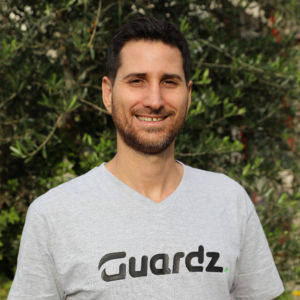Guardz: Defending the “Underdog” Against Cyber Threats
by Noam Taylor
I recently sat down to talk with Dor Eisner, CEO and Co-Founder of Guardz, a company dedicated to defending small to medium-sized enterprises (SMEs) from cyber threats. Like many of his peers in Israel’s cybersecurity sector, Eisner previously served as a commander in the IDF cyber unit 8200. He has also worked with the government as a cybersecurity expert. Eisner and his partners launched Guardz in 2022.

Dor Eisner, Co-Founder and CEO of Guardz
“Our mission at Guardz is to help the ‘underdog’,” explained Eisner. “We generate solutions designed to fortify small businesses that often lack the cyber resources of corporate giants. Guardz steps in with strategies that allow them to thrive in the turbulent waves of today’s cyber world.” Guardz provides 360-degree analysis and attack response for its small business customers, as well as for managed security providers (MSPs) that also serve this segment of the market. Guardz also provides its clients with an agency service that connects them with cyber insurance platforms that know and trust Guardz.
Guardz is gaining traction in the market because small businesses usually do not have personnel at the ready to respond to cyberattacks. If all they receive is an alert that something is amiss or that malware has been detected, they may have no real ability to respond to it. Guardz offers a solution. Instead of merely monitoring a network and notifying clients about irregularities, Guardz does some of the incident response for them.
For example, if an American SME has an employee logging in from an offshore location and it turns out to be a phishing attack, Guardz will block access to the attacker. This is a fundamental pillar of its solution for small businesses, which tend to lack the resources to respond on their own. According to Eisner, “Larger enterprises are commonly equipped to deal with the attacks, but our clients aren’t. We are democratizing cyber protection for everyone in the market.”
Eisner went on to explain that IT cybersecurity is more complex than OT (operational technology) cybersecurity. “The IT systems that Guardz is responsible for are fluid, with a lot more going on than in manufacturing. In an OT setting, there isn’t as much connection to the internet and things are more monotonous,” he said. He added that, with IT, the overall picture and the macro synchronizing of systems is key to a successful security strategy. This isn’t necessarily the case in the world of OT cybersecurity, where the systems are more focused on micro functioning and product output.
At Eisner’s direction, Guardz offers some views of the Dark Web, where cyber criminals hang out to buy and sell stolen information. In his view, the Dark Web began to change a couple of years ago. Instead of simply selling information to each other, hackers began offering cyber tools to junior criminals. “This creates a very dangerous scenario for the field of cybersecurity,” he said. “Both the ubiquitousness of these tools and the level of sophistication contribute to this new challenge.”
Eisner also discussed the evolving role of artificial intelligence (AI) in the cyber universe. According to Eisner, AI has completely shaken the status quo of cybersecurity. With AI, there is open access to sophisticated tools that were once used exclusively by veteran hackers. As he put it, “AI is democratizing the cyber criminal world. But also, it is helping the defenders.”
For instance, Eisner said, “If you ask ChatGPT for a list of different ‘phishing attack’ approaches, you might get something like a hundred.” This attests to the evolution and growth of hacker techniques, but it also reveals how AI enables defenders to identify threats. Eisner is convinced that AI’s role in cybersecurity will only continue to grow in the coming years.
